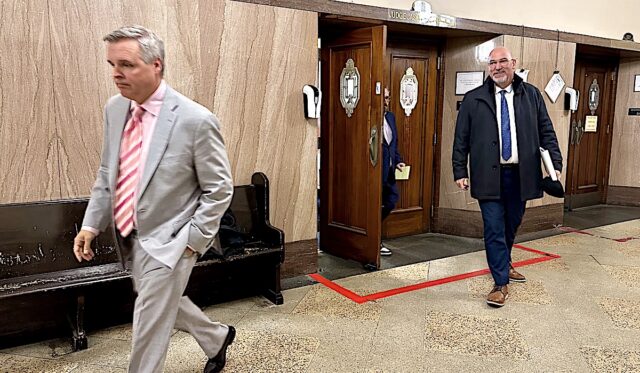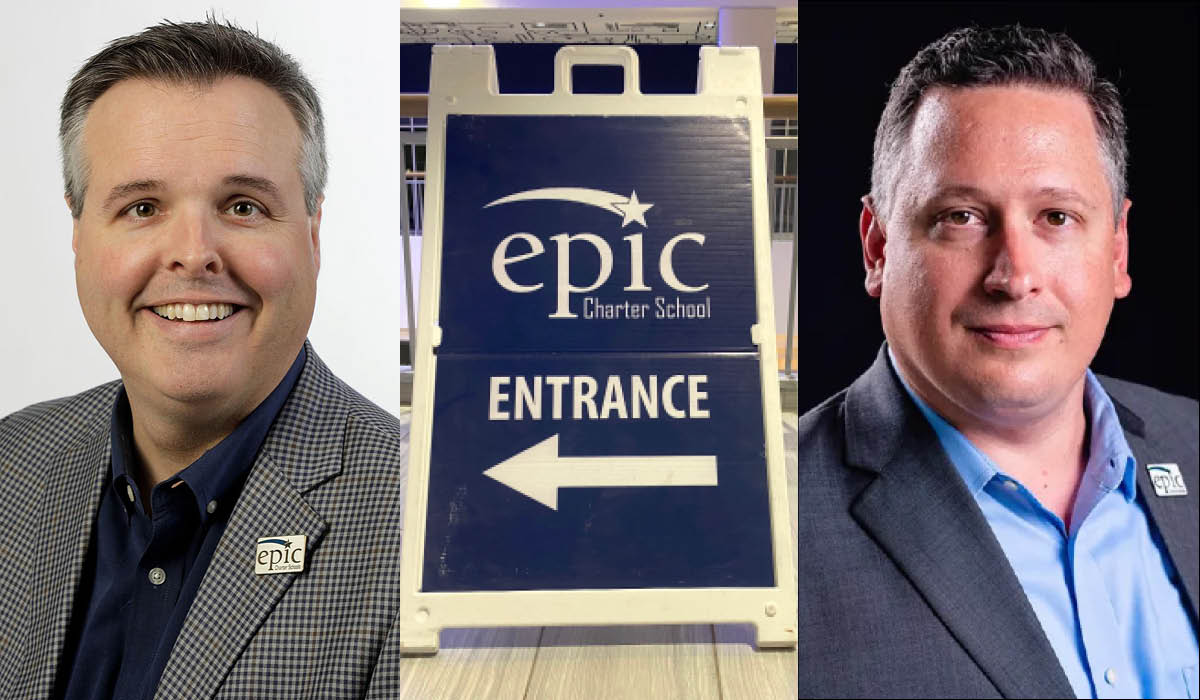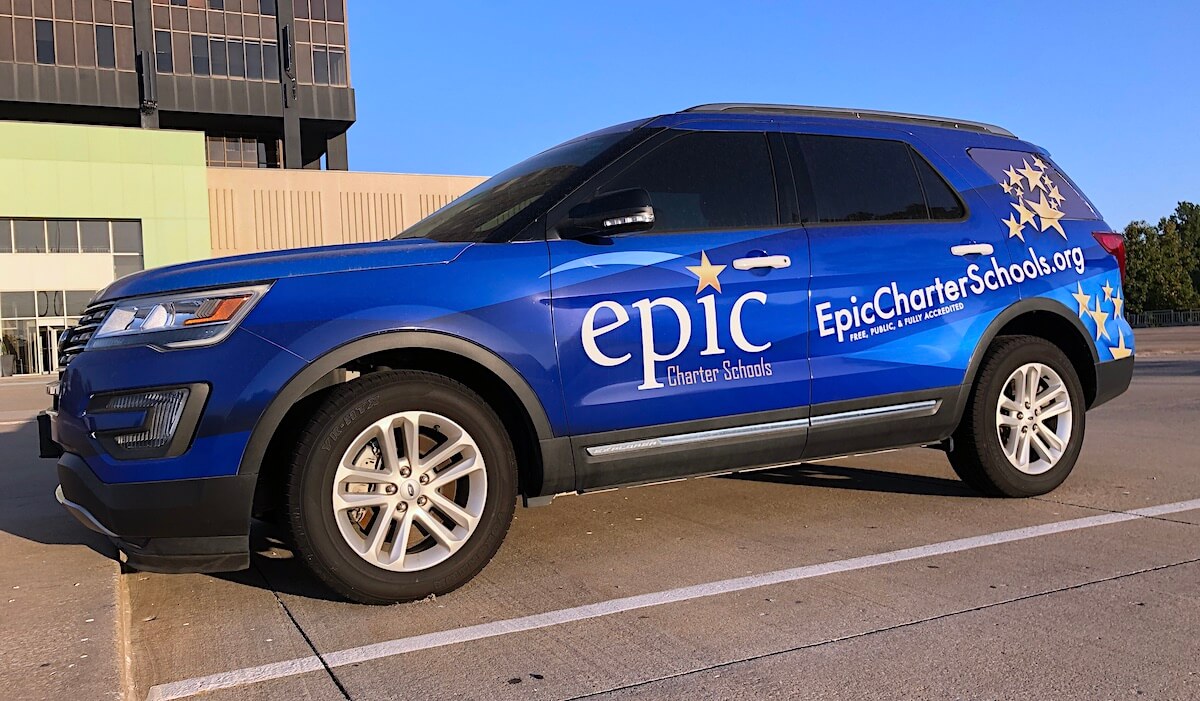

(Update: For a thread about the third day of the Epic embezzlement case preliminary hearing, click here. For a thread about the fourth day, click here. The following article about day one and day two remains in its original form.)
After two days of a potential week-long preliminary hearing for former Epic Charter Schools co-founders David Chaney and Ben Harris, five witnesses have testified on behalf of the state, with many questions probing whether certain monies used by the district were public or private.
Although Harris, Chaney and former chief financial officer Josh Brock all caught charges for embezzlement and racketeering in June 2022, their preliminary hearings were rescheduled numerous times. As a result, 21 months after they were booked into and out of the Oklahoma County Jail, none of the defendants has actually entered a plea yet.
The three men each face 15 counts, including racketeering, embezzlement, fraud, making false statements and money laundering. Brock is scheduled to enter a plea April 3 after waiving his right to a preliminary hearing that started Monday in the crowded courtroom of Oklahoma County District Court Judge Jason Glidewell.
Brock’s decision has spurred speculation he could be called to the stand by prosecutors as part of his own plea deal.
Somewhat unusually, Harris and Chaney exercised their rights to a preliminary hearing, meaning prosecutors in the attorney general’s office must show “probable cause that a crime was committed and probable cause that the defendant(s) committed the crime.” If Glidewell determines prosecutors have met that burden, Harris and Chaney would be bound over for trial.
To that end, Attorney General Gentner Drummond’s assigned prosecutors spent Monday and Tuesday asking a series of witnesses how Harris and Chaney — simultaneously the owners of Epic Youth Services, a management company that received 10 percent of the Epic schools’ state funding — handled money, including millions of dollars deposited into the EYS “learning fund.”
So far, prosecutors have called and defense attorneys have cross-examined:
- Lead OSBI investigator Mark Drummond;
- Former Epic board chairman Doug Scott;
- Current Epic employee Chandler Winningham who works with the learning fund;
- Oklahoma State Department of Education state aid program director Renee McWaters; and
- Epic deputy superintendent of finance Jeanise Wynn.
With their testimony, the witnesses have described a massive online charter school with tens of thousands of enrolled students led by Harris and Chaney, who also owned the for-profit education management organization contracted to run their school.
Drummond, the OSBI agent, outlined the scope of the criminal investigation, which began in 2013 and ultimately involved even federal agents. Drummond testified that federal law enforcement officials believed the matter was more appropriate for state prosecution owing to the source of funds at hand.
In cross-examining Drummond, Harris’ attorney, Joe White, asked the OSBI agent to come right out and say what he meant.
“Are you saying that my client was somehow involved in a scheme?” White asked.
Drummond responded: “Yes.”
“What was the scheme?” White continued.
Drummond said Harris and Chaney were “making money through illegal transactions.”
White pressed further.
“What was illegal?” he asked.
Drummond kept his replies succinct.
“Embezzling money from the state of Oklahoma,” he said.
A public school and a private company

Charter schools are public schools that can be privately run. In Epic’s case, the school board contracted with Epic Youth Services, Harris’ and Chaney’s for profit company, to run what would become two school districts under the Epic banner.
EYS received 10 percent of Epic’s revenue to run the schools. Additionally, EYS received millions of dollars each year from the school to implement the leaning fund, a pot of money that allowed families of students enrolled in the school to spend up to $1,000 on educational items.
State investigators and prosecutors have alleged that Harris, Chaney and Brock inflated school enrollment numbers to transfer more money from the school to the learning fund that was managed by a company they owned.
Speaking after Tuesday’s testimony concluded, White floated an alternate explanation.
“I love public education,” White said. “The thing I find intriguing about this is that when Oklahoma was on its hands and knees, due to COVID and the pandemic, my guy’s brainchild educational technology platform was in full display and performed. What they don’t like — what the old guard education — what they don’t like is when education is run like a business instead of like public education. (The) old guard, they don’t like seeing how much money is being made.”
Prosecutors, however, have attempted to show that EYS was operating in murky legal waters owing to its close ties to the school. Although EYS was paid millions of dollars to run the schools and implement the learning fund, most of the employees who actually managed the learning fund were paid by Epic Charter Schools, not EYS.
Wynn, Epic’s deputy superintendent of finance, testified that she was concerned with Epic Charter School employees being paid to manage a fund that was technically controlled by Harris’ and Chaney’s private company.
Wynn also discussed how Epic Charter Schools’ federal tax identification number was used to purchase items for families through the learning fund, even though it was controlled by EYS and said to be private.
“The learning fund’s money had been presented to me as private funds based on the agreement,” Wynn testified. “So based on my training and knowledge, if private funds are being used to make purchases using a nonprofit’s federal ID number, [that is] not allowed.”
‘How can these two guys have criminal intent?’

White and Gary Wood, who is Chaney’s lawyer, have attempted to show that the learning fund contained private money instead of public money, a technical distinction based on interpretations of how charter schools could contract with private management firms.
White and Wood emphasized that contracts for handling the learning fund were overseen by attorneys.
“How can these two guys have criminal intent when they relied on law firms in the creation of these entities?” White said Monday. “Not only law firms, preeminent law firms. Al Capone doesn’t go to Crowe & Dunlevy and McAfee & Taft for advice and consultation. He goes to them for forgiveness.”
In arguing that the learning fund money was public, prosecutors with the attorney general’s office repeatedly asked witnesses about whether learning fund money could be used to purchase religious materials.
Scott, Winningham and Wynn each testified that families were not allowed to use learning fund money to purchase religious materials. Eventually, Wood and White objected to the repeated questions, saying they were irrelevant.
“I don’t know why we keep going down this religious items thing. I don’t know of any charges that discuss religious items,” Wood said Tuesday afternoon. “I really think what this is going at is the state of Oklahoma has an argument next week on April 2 regarding this exact issue in front of the Supreme Court, and I think that they’re trying to start establishing that now.”
To Wood’s point, Attorney General Gentner Drummond is set to appear before the Oklahoma Supreme Court on April 2 and argue that a potential Catholic virtual charter school is unconstitutional.
Glidewell, the judge, allowed prosecutors to continue questioning witnesses Tuesday about whether religious-based purchases were made with the learning fund.
“I think that’s one of the points that the state is trying to make,” Assistant Attorney General Colleen Galaviz said in defnese of her questioning. “If you’re using public funds, you cannot make purchases for religious items.”
Scott indicated that he understood religious items were not eligible for purchase with learning fund dollars.
“I’m not aware of any religious curriculum being on the Learning Fund list,” Scott testified.
When the Epic embezzlement case hearing resumes Wednesday morning, Wynn is set to retake the witness stand to continue cross-examination by White and Wood.
In preliminary hearings, judges have discretion to allow defense attorneys to call witnesses of their own, which can then be cross-examined by prosecutors.
While it’s unclear who may ultimately be called to the stand this week, White said he believed the legal threshold posed by a preliminary hearing is important, particularly when the attorney general’s office now employs Brad Clark, who formerly represented Epic Charter Schools.
“Did I ever consider waiving preliminary hearing? Why hell no, I didn’t,” White said. “I want to know why they’re prosecuting my guy when he relied on two of the top education attorneys in the state of Oklahoma in Brad Clark and Bill Hickman to write the contract on behalf of the school. I mean, those guys know what they’re doing.”




















